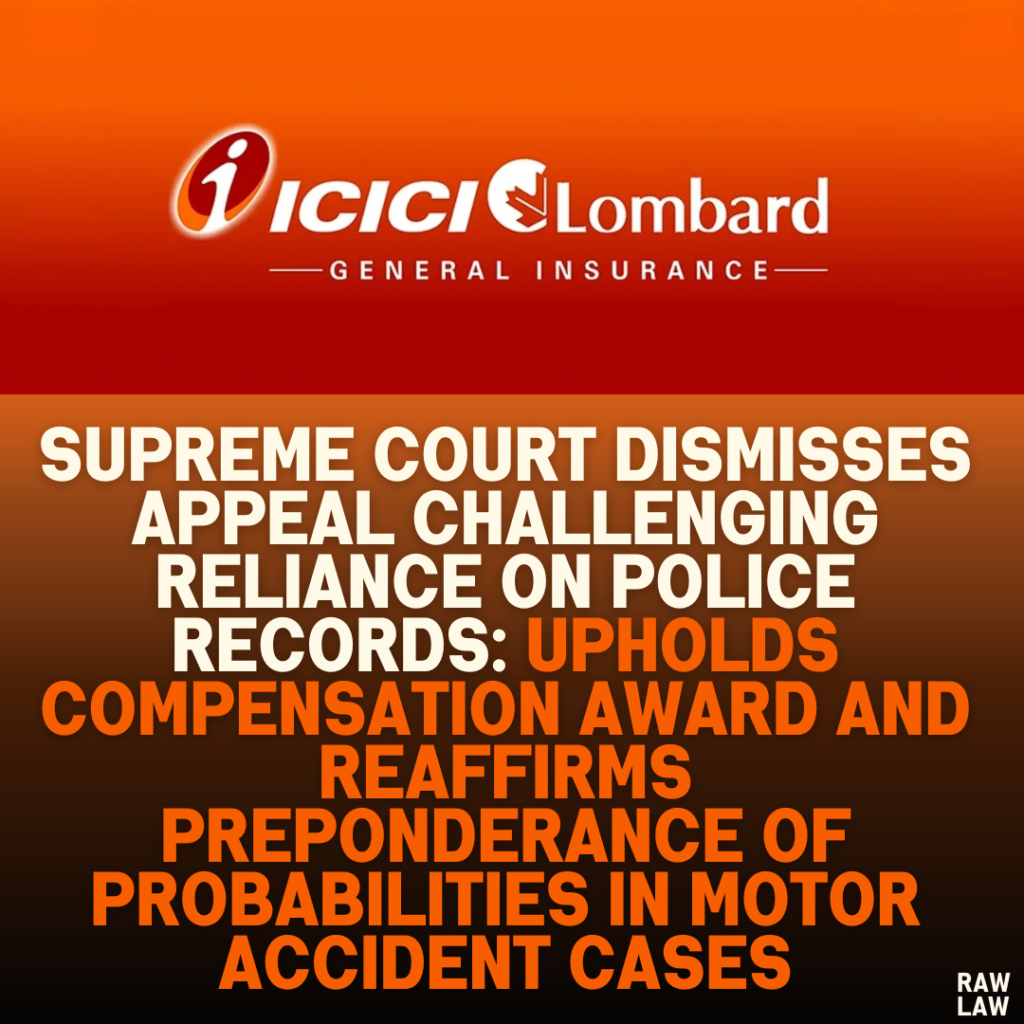Court’s Decision:
The Supreme Court dismissed the appeal filed by ICICI Lombard General Insurance Co. Ltd. against the judgment of the Orissa High Court, which upheld an award of ₹6,77,164 to the legal heirs of the deceased motorcyclist, Udayanath Sahoo. The court observed no irregularity or illegality in the findings of the Tribunal or the High Court and stated:
“We do not find any perversity in the impugned judgment warranting interference by this Court.”
Facts:
- Incident Background:
- The case pertained to a motor vehicle accident on April 27, 2019, where a truck bearing registration number OR-04-D-5675, insured by ICICI Lombard General Insurance Co. Ltd., collided with a motorcycle.
- The accident caused the death of the motorcyclist, Udayanath Sahoo, and severe injuries to the pillion rider.
- Following the accident, an FIR (No. 61/2009) was registered, and a final report by the police attributed the accident to the rash and negligent driving of the truck driver.
- Claims and Tribunal’s Decision:
- The legal heirs of the deceased filed a claim petition under Section 166 of the Motor Vehicles Act, 1988, seeking ₹10,50,000 as compensation.
- The Tribunal awarded ₹6,77,164 with 7% interest per annum from the date of filing till payment, holding the truck driver responsible for the accident based on police records and eyewitness testimony.
- Appeals:
- The insurer appealed to the High Court, contending that the accident was solely due to the deceased’s negligence and challenged the reliance on police records.
- The High Court dismissed the appeal, affirming the Tribunal’s findings.
- Supreme Court Appeal:
- Dissatisfied with the High Court’s decision, the insurer moved the Supreme Court, reiterating similar arguments.
Issues:
- Whether the reliance on police records, including the FIR and charge sheet, by the Tribunal and High Court was justified in determining negligence.
- Whether the insurer proved its allegations of fraud and connivance regarding the preparation of the charge sheet.
- Whether the findings of the Tribunal and High Court were erroneous.
Petitioner’s Arguments (ICICI Lombard General Insurance Co. Ltd.):
- The insurer argued that the accident occurred solely due to the deceased’s rash and negligent driving and not the truck driver’s negligence.
- It claimed that the police charge sheet was fraudulently prepared in connivance with the respondents (claimants).
- The reliance on police records such as the FIR and final report was improper as they were allegedly manipulated.
Respondent’s Arguments (Legal Heirs of the Deceased):
- The respondents asserted that the findings of the Tribunal and High Court were based on credible evidence, including police documents and eyewitness testimony.
- They emphasized that the appellant failed to prove allegations of fraud or manipulation of the charge sheet.
- They defended the reliance on police records, arguing that these were admissible and relevant in motor accident claims adjudication.
Analysis of the Law:
- Preponderance of Probabilities:
- The court reiterated that in motor accident claims, the standard of proof is the preponderance of probabilities, not proof beyond a reasonable doubt, as applied in criminal cases.
- Admissibility of Police Records:
- Referring to Mangla Ram v. Oriental Insurance Co. Ltd. (2018), the court emphasized that police records such as FIRs and charge sheets are admissible and can be relied upon by the Tribunal to determine negligence.
- The judgment in Mathew Alexander v. Mohammed Shafi (2023) underscored that claimants need not prove the occurrence of the accident with strict evidence; a holistic assessment suffices.
- Fraud Allegations:
- The court noted that the appellant’s allegations of fraud and collusion lacked evidence. It observed that the findings of negligence against the truck driver were based on the charge sheet, police investigation, and testimony.
Precedent Analysis:
- Mangla Ram v. Oriental Insurance Co. Ltd. (2018):
- Held that the charge sheet naming the driver of the offending vehicle is prima facie evidence of negligence and can be relied upon in compensation claims.
- Dulcina Fernandes v. Joaquim Xavier Cruz (2013):
- Emphasized the importance of evaluating negligence on the preponderance of probabilities.
- Mathew Alexander v. Mohammed Shafi (2023):
- Reiterated that a liberal and practical approach must be taken in motor accident compensation cases, without insisting on strict proof.
Court’s Reasoning:
- The Tribunal and High Court rightly relied on police records, eyewitness evidence, and the final report, which concluded that the truck driver was at fault.
- The appellant failed to substantiate claims of fraud or manipulation of police documents.
- The court found no reason to interfere with the concurrent findings of the Tribunal and High Court, as these were supported by evidence.
The court stated: “If the police records are available before the Tribunal, taking note of the purpose of the Act, it cannot be said that looking into such documents for the aforesaid purpose is impermissible or inadmissible.”
Conclusion:
The Supreme Court upheld the findings of the High Court and Tribunal, dismissing the appeal. It ruled: “In view of the aforementioned circumstances and taking note of the concurrent findings of the Tribunal and the High Court, we do not find any perversity in the impugned judgment warranting interference by this Court.”
The appeal was dismissed.
Implications:
- This judgment reinforces the principle that police records, such as FIRs and charge sheets, are reliable and admissible evidence in motor accident compensation cases.
- It highlights the lower evidentiary threshold in motor accident claims, focusing on preponderance of probabilities rather than strict proof.
- The decision protects claimants’ rights to compensation by discouraging baseless allegations of fraud without evidence.



